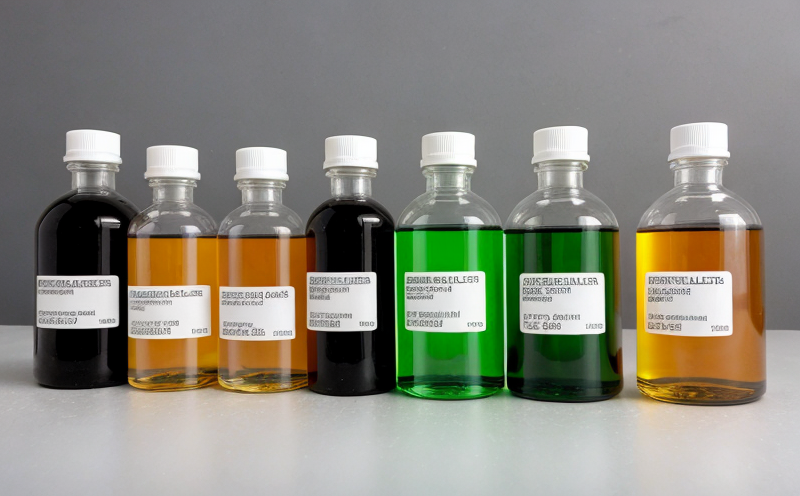Extractables Testing in Ceramic Device Materials
In the realm of medical device manufacturing, ensuring that materials used are safe and do not release harmful substances into the human body is paramount. This necessity drives stringent regulatory requirements for extractables testing, especially when dealing with ceramic device materials.
Ceramic materials, such as alumina, zirconia, and silicon nitride, are widely used in medical devices due to their biocompatibility, strength, and resistance to corrosion. However, the potential for these ceramics to release extractables into bodily tissues necessitates thorough testing. Extractables refer to any substances that can leach or migrate from a material under specific conditions, which could then interact with biological systems.
Eurolab specializes in providing comprehensive extractables testing services tailored to ceramic device materials. Our approach involves a multi-step process designed to mimic real-world scenarios where the device might be exposed to physiological fluids like blood, saline, or other body fluids. This testing ensures that any potential risk from leachable substances is identified early in the development and manufacturing processes.
The initial step in our extractables testing protocol involves a detailed review of the material composition and intended use of the device. This information helps us tailor the test conditions to closely simulate actual usage scenarios. For instance, if the ceramic is used in a hip implant, we will consider exposure to physiological saline solutions that mimic blood chemistry.
Once the testing parameters are defined, our team prepares the specimens according to strict guidelines. Specimen preparation ensures that the material is in its final form and orientation as it would be within the device. This step involves cutting samples into specific dimensions and orientations relevant to their intended use. The prepared samples are then subjected to various extraction methods depending on the ceramic type and expected extractables.
Eurolab utilizes advanced analytical instrumentation for our testing, including Fourier Transform Infrared Spectroscopy (FTIR), Gas Chromatography-Mass Spectrometry (GC-MS), and Liquid Chromatography-Mass Spectrometry (LC-MS). These tools provide precise identification and quantification of the extracted substances. The selection of extraction solvents is critical and varies based on the ceramic type, expected extractables, and regulatory requirements.
After extraction, the samples are analyzed for a wide range of potential leachable compounds including metals, organic solvents, polymers, and other additives that could be present in the ceramic matrix. The results are compared against established standards such as ISO 10993-12:2018, which outlines biocompatibility testing requirements.
Our team then compiles a comprehensive report detailing the extractables identified, their concentrations, and any potential risks they pose to human health. This report is crucial for regulatory submissions and internal quality assurance processes. It also serves as a valuable resource for R&D teams in refining material formulations and process improvements.
In summary, Eurolab’s extractables testing service for ceramic device materials provides medical device manufacturers with the assurance that their products meet stringent safety standards. By leveraging our expertise and advanced analytical capabilities, we help clients navigate complex regulatory landscapes and ensure product quality and reliability throughout development and manufacturing processes.
Benefits
The benefits of Eurolab’s extractables testing in ceramic device materials are numerous and critical for the success of any medical device manufacturer. By engaging our services, clients gain several advantages:
- Compliance with Regulations: Ensures adherence to international standards such as ISO 10993-12:2018 and other relevant regulatory requirements.
- Risk Reduction: Identifies potential risks early in the development process, minimizing the likelihood of product recalls or safety issues post-market release.
- Enhanced Quality Assurance: Provides detailed reports that can be used for internal audits and continuous improvement efforts.
- Increased Market Confidence: Demonstrates a commitment to quality, which is essential in the competitive medical device industry.
- Cost Efficiency: By identifying issues early, clients can avoid costly redesigns and rejections during later stages of development.
Eurolab Advantages
At Eurolab, we pride ourselves on providing unparalleled expertise in medical device testing. Our advantages include:
- Experienced Professionals: Our team comprises highly skilled scientists and engineers with extensive experience in the field of medical device testing.
- State-of-the-Art Facilities: Equipped with advanced analytical instruments that ensure accurate and reliable results.
- Comprehensive Reporting: Providing detailed, actionable reports that guide clients in making informed decisions.
- Customized Solutions: Tailoring our services to meet the unique needs of each client and project.
Quality and Reliability Assurance
Quality assurance is an integral part of Eurolab’s commitment to excellence. We employ rigorous quality control measures throughout our testing process, from specimen preparation to final analysis. Our facilities are accredited according to ISO/IEC 17025:2017 standards, ensuring the highest level of accuracy and reliability in our results.
Our team follows strict protocols for each test, using standardized methods that adhere to international standards such as ISO 10993-12. This ensures consistency and reproducibility of results across different projects. Regular internal audits and external accreditation reviews further reinforce our commitment to maintaining the highest quality standards.
By partnering with Eurolab, clients can rest assured that their extractables testing is conducted in a controlled, reliable environment. Our quality management systems are designed to identify potential issues early on, allowing for timely corrective actions. This proactive approach not only enhances product reliability but also supports continuous improvement initiatives within the client’s organization.





